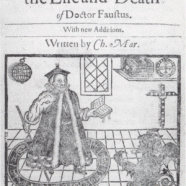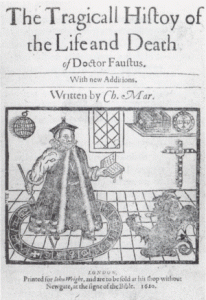
In the witch trials that raged across Europe in the 16th and 17th centuries, legal authorities strove to uncover evidence of a pact between the accused witch and the devil. But did this alleged pact ever exist except in the imaginations of the witchfinders?
The legend of Doctor Faustus captivated the public because it purported to reveal the story of real-life German magician, alchemist, and astronomer, Johann Georg Faust, who died in 1540. Rumour had it that his powers were given to him by the devil. His legend first appeared in print in a 1587 chapbook, Das Faustbuch, a cautionary tale of how the unbridled pursuit of knowledge can undermine religious salvation.
Inspired by this pamphlet, Christopher Marlowe (1554-1593) penned his masterpiece, The Tragical History of the Life and Death of Doctor Faustus, the first surviving published copy of which is dated 1604. No simple moral tale, Marlowe’s tragedy works on a number of levels.
Set in Wittenberg, Germany, the great humanistic centre of learning and the cradle of the Reformation, Marlowe’s Faustus is a low born man who has become a respected Doctor of Philosophy at the university. But this is not enough. He would have absolute knowledge, absolute power. And so he turns to the dark arts. Casting a circle, he abjures the name of God and summons a demon, Mephistopheles. Under Mephistopheles’s direction, Faustus then makes his pact with the devil, signing it in his own blood. He strikes a hard bargain. For twenty-four years, Faustus will do whatever he wants, with Mephistopheles as his obedient servant. When his time is up, Lucifer will summon Faustus to hell.
While the party lasts, Faustus lives it up. The middle of the play is full of schoolboy pranks. His horse is an enchanted hay bale which he sells to a hapless tavern keeper for fifty thalers. Mephistopheles spirits Faustus to the Vatican so that he can mock the pope and cardinals. When the pontiff and his men try to exorcise Faustus and his host of demons with bell, book, and candle, they find they cannot. In Marlowe’s play, the pope is depicted as powerless to expel evil because he himself is corrupted and damned. Marlowe’s own anti-Catholicism is well documented. While a student at Corpus Christi College in Cambridge, he served as a government spy, infilitrating Catholic circles to uncover plots against Queen Elizabeth I.
At the Emperor’s court, Faustus conjures Alexander the Great and his paramour. He even manages to conjure up the spirit of Helen of Troy.
Yet when all these merry japes are over, Faustus finds himself utterly alone and bereft, forced to face the full weight of his pact. Though he desperately seeks redemption, he never achieves it and so quietly resigns himself to his coffin where he awaits his damnation.
Moral interpretations of the play are complicated by the Protestant teachings of Marlowe’s era that insisted it was impossible for the individual to save his or her own soul. Calvin preached the doctrine of predestination, namely that God had already determined who was damned and who was saved, without any reference to the person’s virtue or deeds. Seen through this lens, Faustus is not damned because he sold his soul to the devil. No, he is a clever Renaissance man who strikes this bargain because he has already been damned by his own God; our hero wants to at least enjoy some pleasure and self-determination in this earthly life before his inevitable eternity in hell. In witnessing Faustus’s yearning and failure to achieve redemption are we seeing the devastating implications of Calvinist dogma?
Marlowe’s Doctor Faustus was a sensation when it was first performed, scandalizing its audience by featuring forbidden acts of conjuration and blasphemy on stage.
Marlowe himself is a shadowy figure. In London, he kept the company of mathematicians, poets, and scientists, who gathered in a secret School of Night. Did Marlowe himself indulge in the dark arts? We will never know.
On May 30, 1593, the playwright, previously arrested on charges of brawling and duelling, became embroiled in a dispute with a tavern keeper over his bill. This escalated into a full blown knife fight, resulting in the playwright’s death. He was twenty-nine years old.
Around this time, a note delivered to the authorities stated that Marlowe was an atheist who believed “that the first beginning of Religion was only to keep men in awe.” But it is impossible to judge the veracity of this claim. Marlowe the man remains as shrouded in mystery as the legendary Faustus himself.
It’s interesting to contrast Marlowe’s Faustus to the version by Goethe, the great German Romantic. Goethe, who studied philosophy, alchemy, mysticism, and natural magic, appeared to have felt a great deal of sympathy with Faustus. Instead of demonising him, he invites us to identify with his protagonist’s tireless quest to understand the mysteries of existence. Significantly, Goethe’s Faustus receives redemption. Angels carry him off to heaven before Mephistopheles can drag him down to hell.
Manchester Royal Exchange Theatre’s production of Christopher Marlowe’s Doctor Faustus was absolutely magical, making maximum use of the circular stage to create the magic circle around which the audience hovers, as though we are spectral witnesses to Faustus’s damnation.
This is no dry production but an enchanting pageant meant to capture the Elizabethan sense of awe at the magic taking place before us.
Lucifer (actor Gwendoline Christie) appears as a woman in glittering chainmail, who flies down from the ceiling on a trapeze. The actor appears to have great fun with her role, cackling and lounging on Faustus’s desk while he mourns his doom and the impossibility of redemption.
A host of twenty four extras play the part of spirits, demons, and courtiers, mingling with the audience before descending on ladders onto the stage. Huge puppets appear as the host of Seven Deadly Sins. Faustus even engages in actual stage conjuring. But at the centre of it all is the powerful chemistry between Patrick O’Kane, who plays the volatile Faustus, and the quiet understatement of Ian Redford’s Mephistopheles, who appears as an unassuming old man in a vicar’s suit.
Ultimately the play is a powerful meditation on free will and the soul, and how willing people are to sacrifice their soul for fleeting ambition.
My husband, who saw the play with me, observed that in the modern corporate world, people sell their souls for a lot less than Doctor Faustus, who had least had some fun while the party lasted.
Manchester Royal Exchange Theatre’s production of Doctor Faustus runs until October 9.
Dr. Naomi Baker’s essay on Christopher Marlowe’s Doctor Faustus




